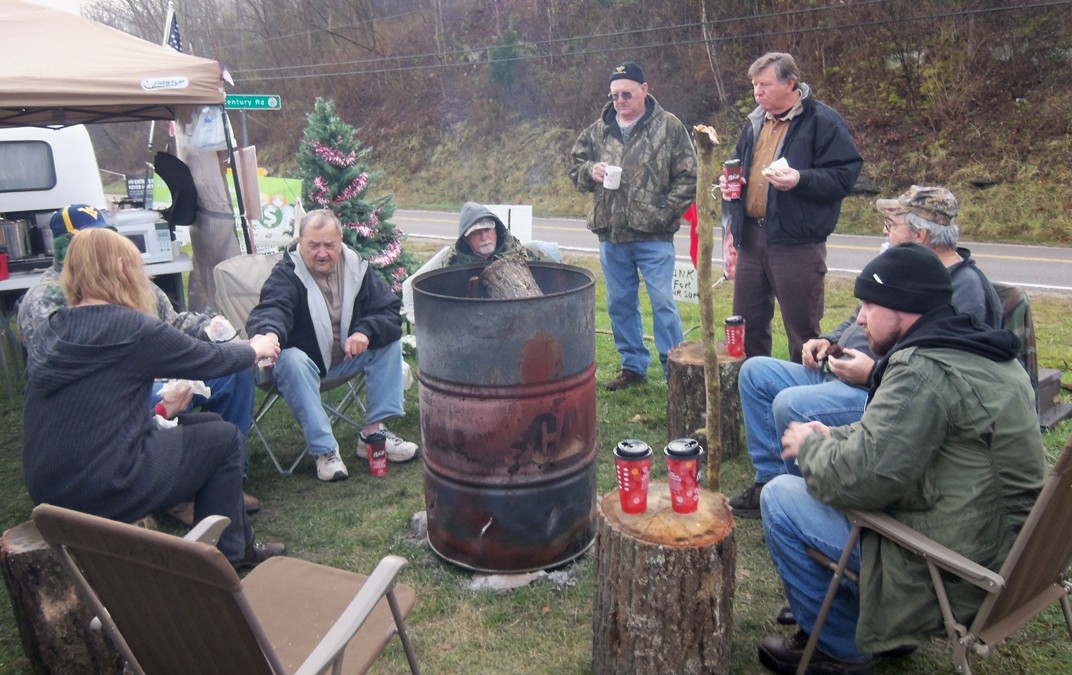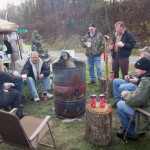When I began work in the lab at the Constellium Rolled Products plant in Ravenswood, W.Va., the guys who’d worked with my grandfather there before he retired called me Hoot. It had been their name for him. So it was an honor to inherit it. And their granting me the moniker they’d first bestowed on him made me feel embraced by the union family at Constellium.
This is what my grandfather, Luther Howard “Hoot” Gibson, had always told me that he cherished most about work: the extended family it gave him. He was proud of his labor as a maintenance man at the plant and proud of the aluminum he helped produce. Most important throughout his life, though, has been the fellowship with his United Steelworkers Local 5668 brothers and sisters. In so many ways he taught me that while it’s important to do any job well, real job satisfaction comes from building bonds with co-workers. He constructed enduring relationships with union brothers and sisters, friendships that would stand the tests of time and travail.
I was born in 1990, so I was just a toddler when my grandfather and his USW brothers and sisters struggled through a lockout that began at the Ravenswood plant on Halloween 1990 and that would become so historic in the labor movement that a book would be written about it. During 20 long months without paychecks, my grandfather and his fellow Local 5668 members stood together. They gathered community and political support. They enlisted the USW headquarters to back them with lawsuits, NLRB petitions and international pursuit of the aluminum plant’s main investor. My grandpa’s local union established a food bank for workers’ families, held rallies, followed trucks out of the plant to pressure customers not to buy scab aluminum, and picnicked weekly at the union hall with potluck casseroles, member-played music, and camaraderie that would last a lifetime. Fewer than two dozen of the plant’s 1,700 USW members crossed the picket line. Ultimately, my grandpa and his union brothers and sisters triumphed. They returned to work on June 29, 1992.
The stories he told me of those trying, and in retrospect, exhilarating times, would sustain me when, just months after I started work in 2012 at the aluminum rolling mill in Ravenswood, the local went out on strike. On my way home from picket duty, I would stop by my grandpa’s house for guidance and renewal. My grandma made beans and cornbread and brought it to the picket line. Sometimes my grandpa visited us there. He and his buddies from the Steelworkers Organization of Active Retirees (SOAR) regaled us with tales of the lockout. They told of the night the plant’s guards marched shoulder to shoulder down Century Road from the plant toward the picket line, banging their riot shields with billy clubs. This failed to faze the picketers, some of whom had served in the military.
My grandpa recalled showing up for picket duty one night and noticing a television at the locked-out workers’ shanty with too many people gathered round it. Warned that several of the extras were FBI agents watching the Super Bowl while off duty from investigating broken windows and slashed tires, my grandpa recounted quickly stashing his, shall we say, satchel of lock-out tools under the shack before joining the group.
I was raised in a union family. My great grandfather was a United Mine Worker, grandfather a Steelworker, and father a utility union member at the Kyger Creek Power Plant in Cheshire, Ohio. As a 10-year-old hearing the warning, “Never cross a picket line,” I responded, “OK,” even though I didn’t know what that meant. When my strike occurred, I understood. I saw the value of all workers sticking together for a cause. Only a tiny handful of the plant’s nearly 700 workers turned their backs on their union family and crossed the picket line. For me, the time out of work was much shorter than the lockout was for my grandfather. It was seven weeks altogether before we accepted a five-year contract. But now, in both visceral and intellectual ways, I know what solidarity with co-workers means. The issue we fought for, health insurance, wasn’t as important to me personally as it was to older workers because I am young and healthy. But I believe that an issue for one is an issue for all, especially when it’s health care. I know the importance of secure health insurance because of what happened to my grandfather.
After 38 years at the plant, my grandfather retired in 1996. He told me he kind of hated to do it because he enjoyed the work with such a good group of guys. He had labored for four decades under the impression that each day, in addition to wages, he was earning retirement benefits guaranteed in contract after contract, including company-paid health insurance. But, suddenly, the company betrayed him. Thirteen years after my grandpa retired, the company that owned the smelter part of the plant in Ravenswood, Century Aluminum, shut it down. And within two years, Century, which operates other aluminum facilities, told the West Virginia retirees that it would no longer honor its commitment to pay for health insurance or for medical services not covered by Medicare.
This was at the time of the Occupy Wall Street movement across the country, and the retirees, including my grandpa, took a cue from their grandkids. These SOAR members – a dozen men and women in their 60s, 70s, even 80s – set up tents on a median outside the closed smelter. It was Dec. 18, 2011, not a comfortable time for arthritic people to be sleeping on the ground outside. They stayed for 75 days, until March 2, 2012, when they thought they’d negotiated a deal for resumption of benefits to about 540 retirees. In the end, that fell through, but they’re still fighting, pursuing a lawsuit with the help of the legal team at the USW international.
That’s the mettle forged in the 1990s lockout, the story of which I first read as a middle school student in Tom Juravich and Kate Bronfenbrenner’s book, “Ravenswood: The Steelworkers’ Victory and the Revival of American Labor.” My grandfather inspired me to join the union health and safety committee. I’ve completed my master’s degree in safety engineering and am now serving an internship in the health, safety and environment department at the USW international. My grandfather’s union brothers and sisters gave him his nickname for the silent movie and early talkie cowboy star Hoot Gibson. But he’s no Lone Ranger. He’s a union man. He’s revels in his extended union family. And so do I.
Ashlee Fitch is a USW Health, Safety and Environment Intern
Ashlee Fitch’s grandfather, Luther Howard “Hoot” Gibson, pictured center holding a coffee cup, is shown on one of the 75 days of the “Occupy Century” protest by Century retirees after their employer cut off their health insurance (photo courtesy of the author).


